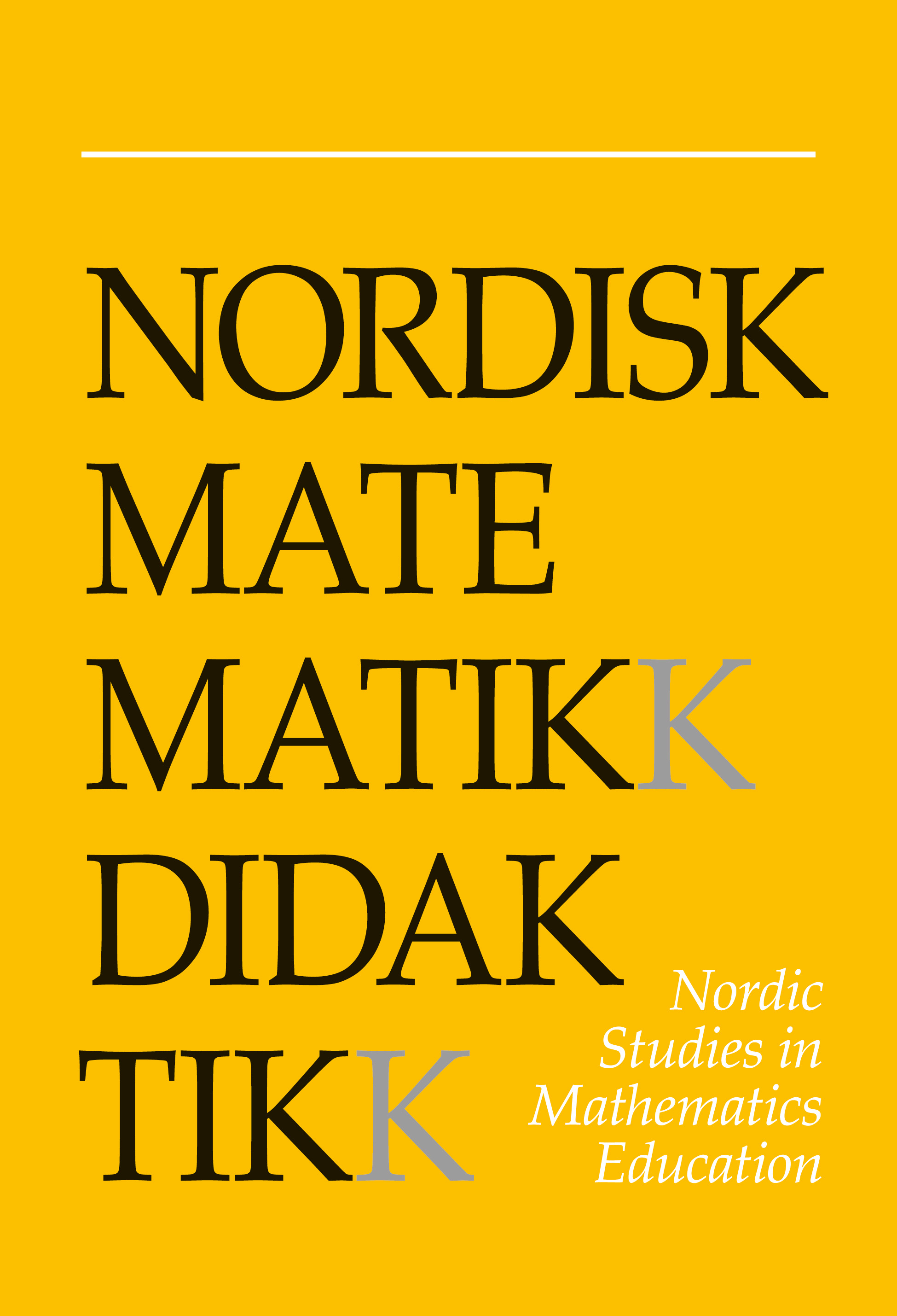Algebra teachers’ questions and quandaries – Swedish and Finnish algebra teachers discussing practice
DOI:
https://doi.org/10.7146/nomad.v24i3-4.149040Abstract
Taking the teachers’ own practices as a point of departure, this study investigates what areas of mathematical knowledge algebra teachers brought up in collegial discussions and how they used their knowledge in acts of decompressing, trimming and bridging. The discussions centered around aspects of teaching and learning school algebra previously shown to be problematic, but gave rise to mathematical quandaries, revealing gaps in the teachers’ own understanding of the mathematical content. The study implies that the ability to unpack a mathematical concept is essential in algebra teaching and that teachers may need external input concerning mathematical knowledge to enable development in pedagogical content knowledge.
References
Ball, D. L. & Bass, H. (2000). Interweaving content and pedagogy in teaching and learning to teach: knowing and using mathematics. In J. Boaler (Ed.), Multiple perspectives on mathematics teaching and learning (pp. 83-104). Westport: Ablex. https://doi.org/10.5040/9798400688362.0008
Ball, D. L., Thames, M. H. & Phelps, G. (2008). Content knowledge for teaching: What makes it special? Journal of Teacher Education, 59 (5), 389-407. https://doi.org/10.1177/0022487108324554
Bommel, J. van (2014). The teaching of mathematical knowledge for teaching - a learning study of primary school teacher education. Nordic Studies in Mathematics Education, 19 (3-4), 185-201.
Bruner, J. S. (1960). The process of education. Cambridge: Harvard University Press. https://doi.org/10.4159/9780674028999
Bush, S. B. & Karp, K. S. (2013). Prerequisite algebra skills and associated misconceptions of middle grade students: a review. The Journal of Mathematical Behavior, 32 (3), 613-632. https://doi.org/10.1016/j.jmathb.2013.07.002
Carraher, D. W., Schliemann, A. D., Brizuela, B. M. & Earnest, D. (2006). Arithmetic and algebra in early mathematics education. Journal for Research in Mathematics Education, 37 (2), 87-115. https://doi.org/10.2307/30034843
Chick, H. (2009). Teaching the distributive law: Is fruit salad still on the menu? In R. Hunter, B. Bicknell & T. Burgess (Eds.), Crossing divides: proceedings of the 32nd annual MERGA conference. Palmerston North: MERGA. Retrieved from https://merga.net.au/Public/Public/Publications/Annual_Conference_Proceedings/2009_MERGA_CP.aspx
Cornwall, A. & Jewkes, R. (1995). What is participatory research? Social Science & Medicine, 41 (12), 1667-1676. https://doi.org/10.1016/0277-9536(95)00127-S
Hodgen, J., Oldenburg, R. & Strømskag, H. (2018). Algebraic thinking. In Dreyfus, T., Artigue, M., Potari, D., Prediger, S. & Ruthven, K. (Eds.), Developing research in mathematics education - twenty years of communication, cooperation and collaboration in Europe (pp. 32-45). Oxon: Routledge. https://doi.org/10.4324/9781315113562-4
Hsiu-Fang, H.-F. & Shannon, S. E. (2005). Three approaches to qualitative content analysis. Qualitative Health Research,15 (9), 1277-1288. https://doi.org/10.1177/1049732305276687
Holmqvist, M. & Wennås Brante, E. (2011). What is discerned in teachers' expressions about planning? Similarities and differences between teachers from Sweden and Hong Kong. Education Inquiry, 2 (3), 497-514. https://doi.org/10.3402/edui.v2i3.21996
Hunter, J., Anthony, G. & Burghes, D. (2018). Scaffolding teacher practice to develop early algebraic reasoning. In C. Kieran (Ed.), Teaching and learning algebraic thinking with 5- to 12-year-olds (pp.379-401). London: Springer. https://doi.org/10.1007/978-3-319-68351-5_16
Jacobs, V. R., Franke, M. L., Carpenter, T., Levi, L. & Battey, D. (2007). Professional development focused on children's algebraic reasoning in elementary school. Journal for Research in Mathematics Education, 38 (3), 258-288. https://doi.org/10.2307/30034868
Kazemi, E., & Franke, M. L. (2004). Teacher learning in mathematics: using student work to promote collective inquiry. Journal of Mathematics Teacher Education, 7, 203-235. https://doi.org/10.1023/B:JMTE.0000033084.26326.19
Kieran, C. (Ed.) (2018). Teaching and learning algebraic thinking with 5- to 12-year-olds. London: Springer. https://doi.org/10.1007/978-3-319-68351-5
Kilhamn, C. (2014). When does a variable vary? Identifying mathematical content knowledge for teaching variables. Nordic Studies in Mathematics Education, 19 (3-4), 83-100.
Kilhamn, C. & Säljö, R. (Eds.) (2019). Encountering algebra. A comparative study of classrooms in Finland, Norway, Sweden, and the USA. Cham: Springer. https://doi.org/10.1007/978-3-030-17577-1
MacGregor, M. & Stacey, K. (1997). Students' understanding of algebraic notation: 11-15. Educational Studies in Mathematics, 33 (1), 1-19. https://doi.org/10.1023/A:1002970913563
Marton, F. (2015). Necessary conditions of learning. London: Routledge. https://doi.org/10.4324/9781315816876
McCrory, R., Floden, R., Ferrini-Mundy, J., Reckase, M. D. & Senk, S. L. (2012). Knowledge of algebra for teaching: a framework of knowledge and practices. Journal for Research in Mathematics Education, 43 (5), 584-615. https://doi.org/10.5951/jresematheduc.43.5.0584
Nyman, R. & Kilhamn, C. (2014). Enhancing engagement in algebra: didactical strategies implemented and discussed by teachers. Scandinavian Journal of Educational Research, 59 (6), 623-637. https://doi.org/10.1080/00313831.2014.965790
Rystedt, E., Helenius, O. & Kilhamn, C. (2016). Moving in and out of contexts in collaborative reasoning about equations. The Journal of Mathematical Behavior, 44, 50-64. https://doi.org/10.1016/j.jmathb.2016.10.002
Röj-Lindberg, A.-S. (2017). Skolmatematisk praktik i förändring - en fallstudie (PhD thesis). Vasa: Åbo Akademi University.
Röj-Lindberg, A.-S., Partanen, A.-M. & Hemmi, K. (2017). Introduction to equation solving for a new generation of algebra learners. In T. Dooley & G. Gueudet (Eds.), Proceedings of CERME 10 (pp. 496-503). Dublin: DCU Institute of Education and ERME.
Silverman, J. & Thompson, P. W. (2008). Toward a framework for the development of mathematical knowledge for teaching. Journal of Mathematics Teacher Education, 11, 499-511. https://doi.org/10.1007/s10857-008-9089-5
Wasserman, N. (2015). Unpacking teachers' moves in the classroom: navigating micro- and macro-levels of mathematical complexity. Educational Studies in Mathematics, 90 (1), 75-93. https://doi.org/10.1007/s10649-015-9615-1
Wassermann, N. & Stockton, J. (2014, February). The impact of teachers' knowledge of group theory on early algebra teaching practices. Poster presented at the AMTE annual conference, Irvine. Retreived from https://www.tc.columbia.edu/faculty/nhw2108/faculty-profile/files/NCTM-2013-Poster.pdf
Downloads
Published
How to Cite
Issue
Section
License

This work is licensed under a Creative Commons Attribution-NonCommercial-ShareAlike 4.0 International License.



